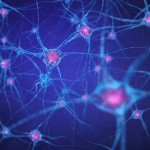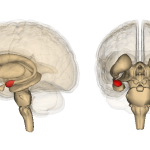The Science of Brain Training
The latest science on brain development suggests two findings that are very positive for perceptual motor skills training. The first is that neural synapses can be ‘re-routed’. That means that dysfunctional brains can be trained to sustain higher levels of functionality. Second, the discovery of something called neural plasticity means that effective and consistent training can result in permanent positive effects in improved brain function.
 The goal of perceptual motor training is to train the brain to maximize efficiency in how it routes information across neural synapses to produce desired outcomes1. What we take in through our senses is passed along through different parts of the brain to produce desired outcomes. In the case of motor skills, those outcomes largely focus on the functions of the various parts of our body—arms, legs, hands, mouth, eyes, etc. These functions affect all areas of life: speech, activity, movement, balance, reading, writing, focus, cognitive skills, and more.
The goal of perceptual motor training is to train the brain to maximize efficiency in how it routes information across neural synapses to produce desired outcomes1. What we take in through our senses is passed along through different parts of the brain to produce desired outcomes. In the case of motor skills, those outcomes largely focus on the functions of the various parts of our body—arms, legs, hands, mouth, eyes, etc. These functions affect all areas of life: speech, activity, movement, balance, reading, writing, focus, cognitive skills, and more.
Mitigating Neural Inefficiency
 Almost all brains have some level dysfunction. There are built-in inefficiencies in the synapses for transmitting information from our perception centers to our motor control centers. Most people often compensate for deficiencies at a level that is often imperceptible. Children and adults with ADD, ADHD, ASD, Asperger’s Syndrome, Dyslexia, and similar challenges deal with neural dysfunction at a level that requires a significant amount of physical and mental compensation to overcome the synaptic inefficiencies that have developed in their brains2.
Almost all brains have some level dysfunction. There are built-in inefficiencies in the synapses for transmitting information from our perception centers to our motor control centers. Most people often compensate for deficiencies at a level that is often imperceptible. Children and adults with ADD, ADHD, ASD, Asperger’s Syndrome, Dyslexia, and similar challenges deal with neural dysfunction at a level that requires a significant amount of physical and mental compensation to overcome the synaptic inefficiencies that have developed in their brains2.
 The problem is that current medical “solutions” largely resort to band-aid style chemical/pharmaceutical treatment of symptoms, neglecting why the symptoms occur, leaving the source of the problem largely unaddressed. The band-aid “fix” now has many people turning to perceptual motor skills training and sensory alignment practices for answers.
The problem is that current medical “solutions” largely resort to band-aid style chemical/pharmaceutical treatment of symptoms, neglecting why the symptoms occur, leaving the source of the problem largely unaddressed. The band-aid “fix” now has many people turning to perceptual motor skills training and sensory alignment practices for answers.
Long-term Positive Effects
Th e good news is that the latest findings in neural synapse routing and the permanence of neural plasticity indicate that real long-term changes can be experienced by those willing to consistently conduct the proper training3. And the training is often rather simple. For example, conducting simple synaptic-targeting exercises on a daily basis over an extended period of time has been shown to significantly change outcomes in coordination, dexterity, mental focus, fatigue, and temperament4.
e good news is that the latest findings in neural synapse routing and the permanence of neural plasticity indicate that real long-term changes can be experienced by those willing to consistently conduct the proper training3. And the training is often rather simple. For example, conducting simple synaptic-targeting exercises on a daily basis over an extended period of time has been shown to significantly change outcomes in coordination, dexterity, mental focus, fatigue, and temperament4.
Perceptual motor training could be said to explain the ‘how and why’ on what makes Yoga such an effective exercise modality for mental health. But perceptual motor training is more scientifically targeted on improving brain function and efficiency than any physical fitness genre. While Yoga seeks to create a harmonious connection between mind and body, perceptual motor training targets just the motor activation necessary to build neural plasticity in efficient synaptic relays, or simply put: permanent improvement in brain function efficiency.
motor training could be said to explain the ‘how and why’ on what makes Yoga such an effective exercise modality for mental health. But perceptual motor training is more scientifically targeted on improving brain function and efficiency than any physical fitness genre. While Yoga seeks to create a harmonious connection between mind and body, perceptual motor training targets just the motor activation necessary to build neural plasticity in efficient synaptic relays, or simply put: permanent improvement in brain function efficiency.
Find more info. on non-chemical, all-natural, brain training solutions for challenges related to ADD, ADHD, ASD, Asperger’s Syndrome, Dyslexia and more at www.HonePotential.com.
